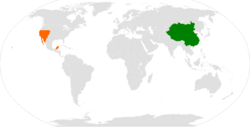China–Kingdom of Sierra relations
 | |
China |
Sierra |
|---|---|
| Diplomatic mission | |
| Chinese Embassy, Porciúncula | Sierran Embassy, Beijing |
| Envoy | |
| Ambassador Zhong Lu |
Ambassador Mark Posner |
China—Kingdom of Sierra relations refers to the international bilateral relationship between the Republic of China and the Kingdom of Sierra. In the 21st century, their relations have been primarily economic in nature and characterised by the large volume of trade between them. Historically they have also been close allies, militarily during the Second Sino-Japanese War, and since the 19th century China has had a significant cultural influence on Sierran society due to the large Chinese diaspora in Sierra (about nine million). Since 2014 relations have become more hostile with the Chinese annexation of the Rehe Province of Manchuria.
Diplomatic relations between China and Sierra were formally established in 1860, with the appointment of the first Sierran minister-plenipotentiary in Peking and a Chinese resident minister in Porciúncula. Sierra did not sign unequal treaties with China like the European powers did and did not send troops to participate in quelling the Boxer Rebellion of 1900, so the Qing Empire had a more positive view of the Sierran kingdom than it did of the other great powers. Millions of Chinese migrated to Sierra during the late 19th century and have had a large influence on Sierran culture. In 1935 the diplomatic missions were upgraded from the ministerial to the ambassadorial level. Sierra provided the most military support to China during the Second Sino-Japanese War out of all the Anglo-American states, and continued to have relations after the end of the Great War. But when the Communist Party emerged victorious from the Chinese Civil War in 1949, Sierra cut off diplomatic relations and refused to recognize the People's Republic of China. Formal relations were not reestablished until the 1965 visit of Prime Minister Earl Warren to China that began a new era in the relationship. Since the 1960s, China opened up to the world, resulting in an explosion of trade between that country and the West, especially Sierra. The 1980s saw a downturn in relations because of the Sino-Tajik War, with Sierra providing support to anti-Chinese, anti-communist insurgents in Tajikistan.
Since the early 1990s, while trade between the two countries increased with the massive growth of the Chinese economy, Sino-Sierran relations have deteriorated due to political disputes. During the Revolutions of 2000, the Beijing Spring brought about the collapse of Landonist China and the restoration of the Republic of China. But the rise to power of President Ren Longyun from 2000 on, who has been accused of authoritarianism, corruption, and numerous human rights abuses, relations between the ROC and Sierra grew worse. The presence of Sierran and other CAS troops in East Asia was opposed by China. The bad relations culminated in the annexation of Rehe Province by the Republic of China from Manchuria in 2014, after which Sierra and other Western countries imposed limited economic sanctions on China. In 2016, Nemesis Heartwell's administration escalated this by beginning a trade war with China. In 2017, a series of military naval confrontations in the South China Sea further heightened tensions, with China claiming sovereign rights to the waters and islands of South China Sea based on the nine-dash line, while Sierra insisted that much of the waters in the South China Sea were international waters, and therefore was a region with freedom of navigation.
In 2020, the initial outbreak of the SARS-CoV-2 in China, and subsequent international spread of the virus, including in Sierra, led to criticism by the Sierran government that the Chinese government poorly mishandled its response. The Heartwell government also promoted conspiracy theories, alleging that the virus was biomedically engineered by Chinese scientists. Anti-Chinese sentiment and xenophobia rose significantly in Sierra, straining relations even further. In May 2020, the Social Democrats under Susan Kwon was elected into power, whose foreign policy signaled a change towards reconciliation with China. The 2021 election in China also represented a shift in government, as the ruling Nationalists failed to secure a majority, and faced a strengthened democratic opposition that initiated new reforms. In March 2021, a high-profile summit was held to "reset" relations.
China maintains an embassy in Porciúncula and consulates in San Francisco City, San Diego, Las Vegas, Honolulu, Phoenix, and Salt Lake City, while Sierra maintains an embassy in Beijing and consulates in Chengdu, Guangzhou, Shanghai, Wuhan, Xian, and Uliastai.
Country comparison
| Republic of China | Kingdom of Sierra | |
|---|---|---|
| Coat of Arms | 
|

|
| Flag | 
|

|
| Demographics | 1,886,012,084 (2018) | 86,097,916 (2010) |
| Area | 3,817,268 sq mi (9,886,678 km2) | 569,037 sq mi (1,473,799 km2) |
| Population density | 405.74/sq mi (156.66/km2) | 151.30/sq mi (58.419/km2) |
| Capital | Beijing | Porciúncula |
| Largest cities | Shanghai Beijing Guangzhou Shenzhen |
Porciúncula San Diego Phoenix Riverside |
| Government | Unitary semi-presidential republic | Asymmetric federal parliamentary constitutional monarchy |
| Current head of state | ||
| Current head of government | ||
| Official languages | Chinese (Mandarin), Manchu, Mongolian, Tibetan | English, Spanish, French, Tondolese, Chinese, Vietnamese, Korean, Japanese, German (federal); Hawaiian (in Hawaii only) |
| Main religions | 73% non-religious or Chinese folk religion 17% Buddhist 6% other religions 3% Christian 1% Muslim |
82% Christian 4% Other Faith 12% Unaffiliated 3% Don't know/refused to answer |
| Human Development Index | 0.752 (high) | 0.934 (very high) |
| GDP (PPP) (2017 est.) | 25.27 trillion ($19,520 per capita) | $5.15 trillion ($61,725 per capita) |
| Expatriates and immigrants | 237,181 Sierrans living in China | 9.3 million Chinese living in Sierra |
| Military troops | 14,600,000 (active and reserve) | 1,000,781 (active and reserve) |
| Military expenditures | $179 billion | $101.83 billion |
| English speakers | 75,300,000 (5.1% of the total population) | 57,281,994 (Native: 77% of the total population) |
| Telecommunications | 73,731,485 |
Economic ties
As the world's largest and the fifth largest economies, respectively, China and Sierra have extensive economic relations. China is Sierra's biggest import partner, accounting for about 16% of the country's imports, valued at about $83 billion. Sierra represents 5% of China's imports, the biggest share out of all Conference of American States countries and several times that of the next American state, the United Commonwealth.




